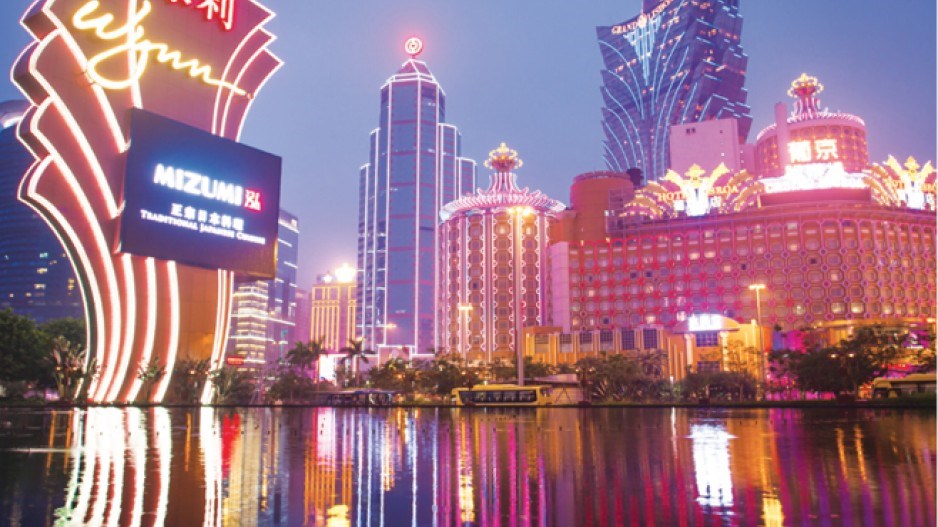Chinese high-rolling gamblers are avoiding their usual playground, the world's casino capital Macau, and seeking safer tables away from the spying eyes of Beijing's graft-busters.
In July, Macau casino revenues from VIP Chinese gamblers were down between 14% and 18% over the same month last year, according to various analysts who study the industry in the former Portuguese colony, which was returned to Beijing's rule in 2000.
Chinese high rollers often use the private gambling facilities in Macau's casinos provided by controversial intermediary companies known as “junkets.” Revenues through junkets accounted for two-thirds of the $45 billion in gambling revenues generated by Macau last year, seven times that of Las Vegas.
According to Macau's Gaming Inspection and Co-ordination Bureau, total casino revenues were down year-on-year 3.7% in June and 3.6% in July, the first time there has been a decline in five years. Many analysts saw June's slide as a one-off, as the attention of Chinese gamblers turned to the soccer World Cup. But a similar drop in July is beginning to look like a trend, and the blame is being put at the door of China's president, Xi Jinping, and the anti-corruption campaign he started soon after coming to power in 2012.
As he came to office, Xi warned that endemic corruption threatened the survival of Communist Party rule. State-controlled media is reporting that 63,000 officials were “disciplined” in the first five months of this year for corruption.
VIP gamblers are staying away from Macau because they fear the scrutiny of the agents of Xi's chief graft-buster, Wang Qishan, head of the Central Commission for Discipline Inspection, the Communist Party's internal Inquisition. Instead of Macau, reasonably well-heeled Chinese gamblers are flying to casinos in other Asian countries, where the industry has developed hugely in recent years in an effort to eat into the Macau market.
Casinos in Vietnam, the Philippines and Malaysia are favourites. Singapore has also moved confidently into the gambling business, and revenues from its two casinos last year were only slightly less than those of the Las Vegas strip.
High-end Chinese gamblers are going even farther afield to avoid the attention of Wang's inquisitors. They are flying to Australia, Europe and, of course, Canada to indulge their passion.
The junket operations in Macau catering to Chinese high rollers have been a matter of contention for many years. Typically, these operations lease private gaming rooms from the casinos, where VIP Chinese gamblers are entertained with not only gambling, but also the best of wine, women and song.
The key service provided by the junkets, however, is credit. Chinese are only permitted to legally take $3,000 out of the country on one visit to an overseas destination, which includes Macau. Junkets get around this by providing credit repayable at home. The casinos are unwilling to provide large amounts of credit, because there is no legal way for them to recover debts in mainland China. The junkets have a higher tolerance for risk, in part, it is alleged by various law enforcement agencies, because of relationships with the Chinese triad criminal gangs, who have many uncomfortable ways of ensuring debts are paid.
The junkets are also claimed to be channels through which some wealthy Chinese avoid Beijing's currency restrictions and spirit assets abroad to havens in Canada, the United States, Australia, Europe and elsewhere.
Macau's casinos are already responding to the decline in VIP business. The Macau branch of Las Vegas Sands Corp. is reported to be cutting the number of VIP tables by 28% and reinforcing its emphasis on mass-market players.
When he disappeared from Macau in May, Huang Shan left massive debts, but he appears to have made off with $1.3 billion of other people's money.
Huang for many years ran a “junket” operation in Macau casinos, providing private gambling rooms and lines of credit for mainland Chinese high-rolling gamblers. Junkets have been a risky, but highly profitable, business, generating two-thirds of Macau's gambling revenue.
The exact reason for Huang's disappearance remains a matter of conjecture, but it is being seen by many observers of the Macau gambling phenomenon as a fulcrum moment, heralding the decline of the junkets.
Recently, the Macau authorities, under pressure from Beijing, have put the junkets under increased scrutiny and regulation. The 220 private gambling rooms the junkets rent from the Macau casinos are a route for corrupt or wealthy Chinese business people and officials to illegally spirit their money out of the country.
In return for payment in China, the junkets offer credit in Macau, from where money can easily be transferred abroad.
But the junkets seem to be victims of China's economic woes as much as of official displeasure. The devaluation of the Chinese currency, the renminbi, earlier this year, rising interest rates and a slump in the value of property have all contributed to belt-tightening among highrollers. Junkets frequently require gamblers to put up their property or equity in their companies as collateral for credit in Macau, and the value of both these assets has slumped.
There are reports that 14 of the small or medium-sized junket operations in Macau have been forced to close down for lack of custom. Meanwhile, the large junket companies are scrambling to diversify.
One of Macau's largest junket operators, Imperial Pacific International Holdings, last week announced it plans to build a $3 billion casino on the Pacific island of Saipan in the Commonwealth of the Northern Mariana Islands.




